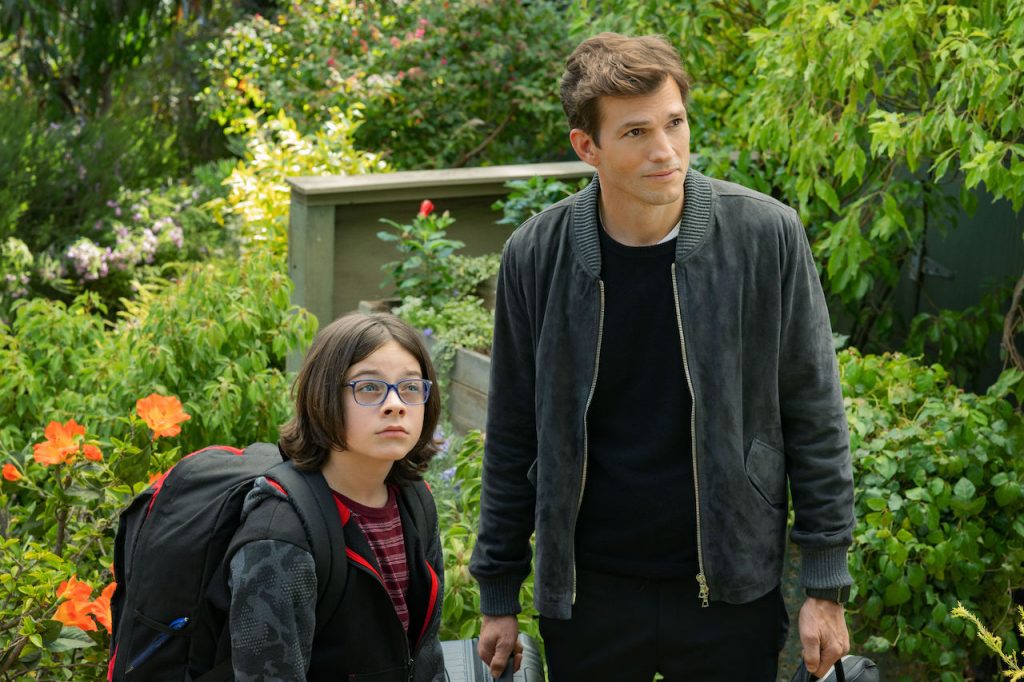Like many good film ideas which have their origins in real life experiences, the provocatively-titled Your Place Or Mine starring Reese Witherspoon (as Debbie) and Ashton Kutcher (as Peter) as star-crossed lovers began when screenwriter Aline Brash McKenna (Cruella, Annie) was housesitting for a male friend in New York City. “That friend was Ted Griffin who wrote Ocean’s Eleven.” He also scored a cameo role as the doorman in Your Place Or Mine. Staying at Ted’s house was an eye-opening experience for Aline. “I got an idea of what it’s like for a man who lives by himself, who hasn’t taken the stickers off his glasses or the shrink wrap off his utensils, or hasn’t cleaned (let alone replaced) his shower curtain,” recalls Aline. “It wasn’t very cosy. It had a coldness and hardness to it.” However, Brosh McKenna did relish the feeling of freedom with Central Park at her doorstep and not having to tend to the needs of others. The screenwriter had two young children with her at the time.
Your Place Or Mine centers on a long distance relationship between besties Debbie and Peter. Peter volunteers to take care of Debbie’s son Jack (Wesley Kimmel) in Los Angeles after the babysitter bails, while she stays at his swanky bachelor pad in New York City for a few days to take her final exam for her Masters degree. Aline’s experiences filtered into Debbie’s during the film as she navigates her way through Peter’s remote-controlled sanctuary.
“I wanted to show that tremendous freedom that Debbie was having. She feels liberated, but also guilty.”
Your Place Or Mine avoids all those zany, improbable romcom tropes containing multiple romantic foils and complicated reasons why two people can’t be together. Its feet are always firmly planted on the ground as Debbie and Peter process their fears and finally unite.
The Rocky Path To Love
Romantic Comedies have been popular staples on our screens and Aline is a long-time fan of them. She loves the recent I Want You Back and Palm Springs. Brosh McKenna doesn’t overthink the components of a successful romcom. “I approach them less as a genre and more as two adults coming of age and solving problems.” She explores Debbie and Peter living their separate adult lives and their romantic attachments. This messiness is more like real life.
Love is what happens while you’re doing other stuff
The screenwriter wanted to show two people Debbie and Peter who are in their forties and stuck in their own lives both professionally and personally. “Their lack of success in their romantic lives is just a reflection of that’s” she asserts.
Many would-be romcom singletons bump into each other, either by happenstance or by design, until they eventually earn their place as a couple. Debbie and Peter in Your Place Or Mine are unique because their affection for each other grows through being apart and living in each other’s homes. They have known each other for decades, briefly hooked up years prior, but remained best friends over the years. So it’s not as if they don’t know each other or afraid of rushing into things. They’ve been a defacto couple all along.
“A lot of people who connect in their early twenties feel that one or both of them are not fully cooked,” ponders Aline. “When Debbie and Peter were first together, she quickly realized that he had issues such as addiction and immaturity to deal with.” Debbie opted to pursue a platonic relationship with him and allow their long-distance friendship to thrive.
Aline Brosh McKenna focuses on the adage of “marrying your best friend.” “To me, that’s very unsexy. Your best friend is someone you go to Costco with. Your spouse or life partner is something more complicated than that.”
The trajectory to Debbie and Peter’s romance is notable. “They start out as love at first sight, then moved to friendship. Finally, they stopped being friends so they can be together.”
Peter’s issues weren’t the only things sabotaging their relationship for decades. Debbie also carries emotional baggage. She craved security to calm her insecurities so she married someone to address these presumptive needs. “When she lacked certainty, her husband had it.” When that marriage fell apart, Debbie needed to reassess her desire for predictability and live some of Peter’s spontaneity.
There are elements of complementation and supplementation in Debbie and Peter’s tumultuous relationship. Peter tells Debbie to let go as she clings on to stuff that no longer serve her. He’s carefree and she’s methodical and controlling. Despite their differences, one also sees pieces of themselves in the other. Debbie impulsively hooks up with book editor Theo (Jesse Williams) and Peter ensures Jack completes his homework.
Debbie and Peter are seemingly polar opposites, except for their mutual love of books and reading.
Based on his track record of problem-solving with commercial brand design clients, Peter agrees to take care of Debbie’s thirteen year-old son Jack not realizing how challenging parenting can be. Jack realizes he may be parent material much later in the game. “I think the moment he realizes it is an improv from Ashton when Jack is playing hockey and scores a goal and Ashton looks at the mom sitting next to him and proudly says, ‘That’s my kid, right there.'”

Jack (Wesley Kimmel) & Peter (Ashton Kutcher) Photo by Erin Simkin / Netflix
Jack is a kid and wants normal kid things – games, hockey, treats, and freedom. “His reverse mentorship of Peter is a little bit accidental. In his selfishness, he inadvertently challenges Peter who’s never had to take anyone else’s needs into consideration.” Both Debbie and Peter are also maturing from the years of being constant, present, supportive, and reliable. to each other. The time may finally be right for him to step into a paternal role. “All the movie needs to do is convince Peter that he can do it for longer than six months,” jokes Brosh McKenna.
Debbie and Peter’s long-distance relationship utilizes a particular dynamic. In many ways they know each other all too well, and in others, they don’t know each other at all. “A virtual relationship based on screens allows a certain degree of intimacy, but it’s not the same as being with each other day to day,” adds Brosh McKenna. “Being in each other’s homes and sleeping in other’s vicariously beds brings them closer together as they get to know each other on a deeper level.”
Your Place Or Mine doesn’t rely on a “I never knew you felt that way” moment. Distance, life stage, and timing weren’t they only things preventing them from being together. “Peter felt he was never good enough for her. As a recovered addict, Peter is an egomaniac with no self-esteem. He appears confident when he really isn’t.”
Debbie’s home-spun, ordered life is in sharp contrast to Peter’s brash glamor. In some respects, she feels she’s not good enough for him either. “Each has their own insecurities about how the other sees them that are based on their own beliefs about themselves.”
“I think we decide on something not great about ourselves and then we try and cast everyone in our life to reinforce that stereotype. I think it’s hard to be flexible in your ideas of yourself.” Being in your forties, takes courage to give yourself permission to unlearn old perceptions to make way for newer ones.
“Breaking out of who you think you are is also hard when other people are holding a certain space for you. It takes a lot of courage to redefine yourself.”

Aline Brosh McKenna
Aline Brosh McKenna loosely based Debbie and Peter’s romance on her on life. “My husband and I were friends for five or six years before we got married. There was a lot of back and forth before we got together. He was living in New York and I was in LA. Now we’ve been married for twenty-five years and all of that courtship phase almost seems a bit risible now because it’s so unrelated to our daily life. Marriage is about who you’re going to do the day to day stuff with.”
The screenwriter discusses the romanticized notions of Cinderella and her handsome prince often seen in romantic comedies. It’s completely unrealistic. He sweeps her off the dance floor because he’s deeply in love with her, yet they’ve never spoken. How could this be a “happily ever after” ending? Aline Brosh McKenna confesses to relating more to Bugs Bunny, Yosemite Sam, Daffy Duck and other Looney Tunes characters.
Not every aspect of Debbie and Peter’s relationship is specifically written on the page. Each actor brought their own nuances to their characters. “Ashton has these incredible bursts of energy. So when he says, ‘Come on, we’re occasioning. Let’s occasion.’ That is Ashton’s soul. Ashton has this pipeline to this silly joy that he brought that to Peter… this kind of silliness and goofiness that you only see in certain moments that are very much brought out by Jack,” notes Aline.
With respect to Reese, “You never have to sell the intelligence. She’s like a little bird. She’s so petite,” she continues.
“I think that a lot of people’s paths in the world are, are somewhat set up by what they look like and their energy. Debbie’s adorableness, which is reflective of Reese’s adorableness, has both empowered her and maybe held her back a little bit. I think coming into her own as a serious intellectual who wants to edit books when you’re this very petite, feminine mom. I actually think there’s an interesting interplay between how kind and angelically pretty she is and a woman experiencing a real challenge with her and others taking her seriously.”
Minka (Zoë Chao), Peter’s ex-girlfriend drops in on Debbie when she’s staying at Peter’s. This is a curious dynamic because she behaves more like Debbie’s best friend offering advice more than acting as Peter’s ex. “I think that people who have dated the same person often have a lot of camaraderie when they meet. Minka and Debbie are so different. I think they’re fascinated with how different the other person is.”
“Minka is somebody who really claims the super high status role, whether she deserves it or not. There’s always something very funny about people who think they’re so fabulous. Minka has a deep sense of her own fabulousness,” quips Aline.
To conclude, we asked Aline Brosh McKenna for her secrets to writing a successful romcom. “I think act one’s always too long. You also need to find the right spot in the middle of the movie where you feel like, how are they gonna fix this problem in their relationship?”
Aline believes the “all is lost moment” at the end of act two is also pivotal because the audience expectations are disrupted and they genuinely believe the characters won’t end up together for a while. This moment occurred in Your Place Or Mine when Debbie and Peter cross paths at the airport. “If he didn’t say something, they may have missed each other forever. And that’s a really scary thought because they could have maybe disappeared from each other’s lives.“
